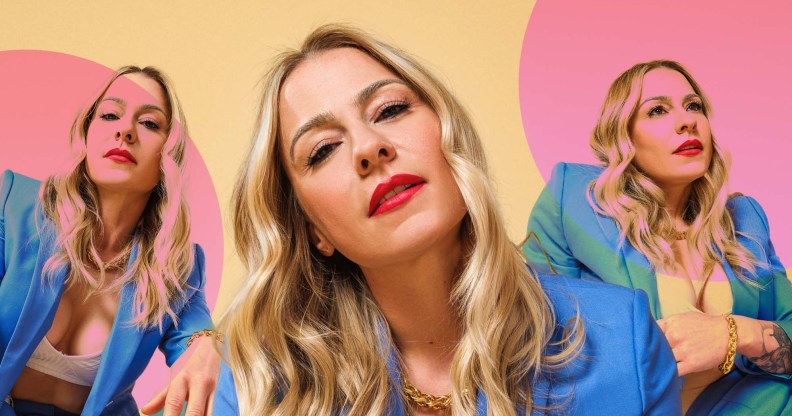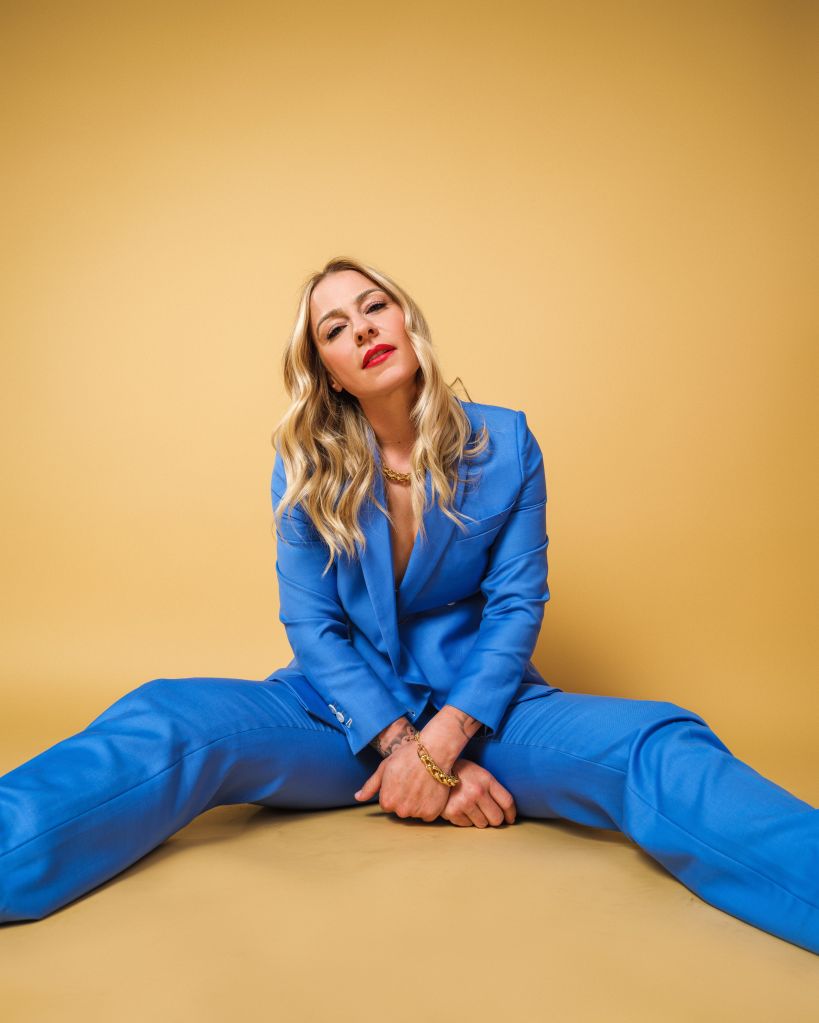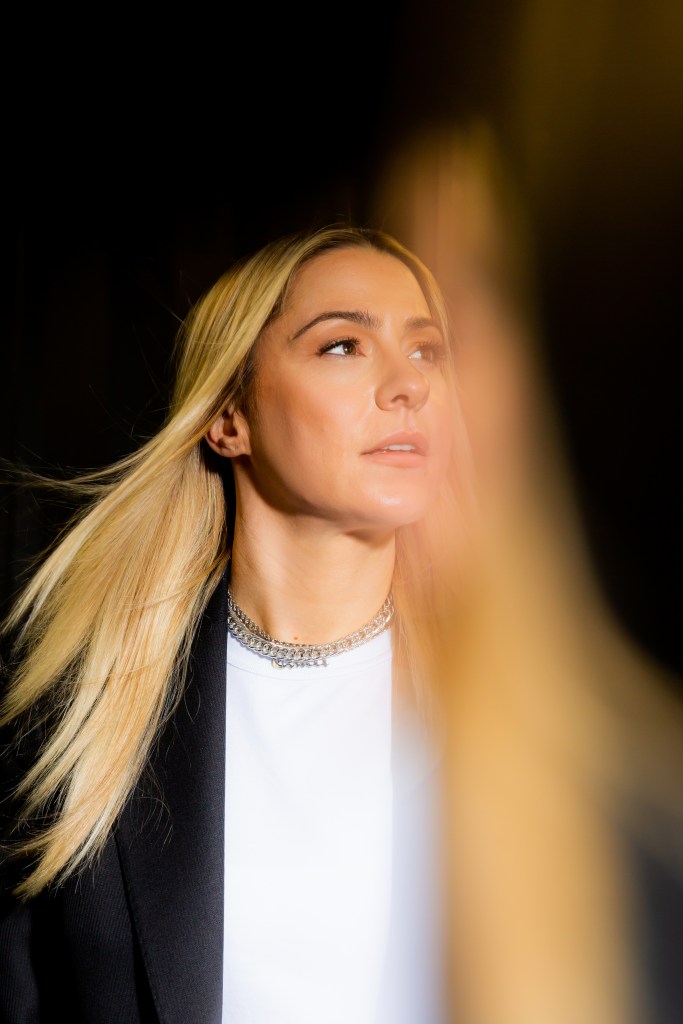X Factor star Lucy Spraggan on healing from trauma, new music and her lifelong gender fluidity

Lucy Spraggan on her latest album, becoming an author and her life-long gender fluidity (Images courtesy of Lucy Spraggan)
A decade after bowing out of The X Factor, Lucy Spraggan tells PinkNews about her latest album, becoming an author and her lifelong gender fluidity.
Since making her name on the ITV singing contest in 2012, Spraggan has carved out a devoted LGBTQ+ fandom with her powerful anthems that celebrate body positivity, queer authenticity and finding hope in the darkest of times – more often than not, gleaned from her own life experiences.
The past few months have been some of the biggest in the singer’s career. Fresh from the publication of her memoir, Process: Finding My Way Through, Spraggan has opened up about past trauma in never-before-told detail, on the eve of the release of their seventh studio, Balance.
After a candid interview with The Guardian last month, Spraggan made headlines for disclosing that the real reason behind her sudden X Factor withdrawal was because a London hotel porter raped her the night she was celebrating fellow contestant, Rylan Clark’s, 25th birthday.
The porter has since been deported after serving four years or a 10-year sentence, according to the Daily Mail.
“Funnily enough, 80 to 90 per cent of the healing had to be done way before this announcement,” Spraggan tells PinkNews about her decision to waive her right to anonymity.
“I [had] no way of measuring public response or media response or anything like that. So, I had to be really sure in my decision and in my strength way before.”

Overwhelming support poured in from fellow celebrities, friends and fans alike, including X Factor judge Simon Cowell, who apologised for the ordeal the “Choices” singer had to go through.
Spraggan, however, is putting her mental health first by staying far away from internet discourse. “In terms of newspapers, I don’t read them,” she says. “I don’t look at them so that makes no difference to the way I feel.
“I haven’t been on social media and when Process was released, me and my girlfriend moved across three different Airbnbs in the Cotswolds. It was really nice.”
Throughout her ordeal, Spraggan is grateful for is the steadfast support from fans.
“My fans are just so unbelievably supportive. I went on a successful tour in May and witnessed all of these people who were there before all of it. They constantly offer me masses of validation. They’re just wonderful people.”
This year marks a new chapter in the Kent-born singer’s life as she channels her personal pain and triumphs into her latest album. And Balance‘s track list leaves no stone unturned.
One song, entitled “Cocaine”, is “from the perspective of someone asking their partner to put them first and stop the nights out, the drinking and the drugs”. The reason I was able to write it is because I have been the partner who was doing those things,” Spraggan admits.
“Bodies”, meanwhile, tackles Spraggan’s well-documented relationship with “body dysmorphia”, while “Caroline” is about the death of TV personality Caroline Flack, whose suicide launched the online #BeKind campaign.

“If you listen back to any of my music – bar a few really awfully sad songs – they have a lot of optimism sewn into them. That’s in my nature. Even when I’m going through some of the s***tiest situations possible, I still have this toxic optimism. That’s what my songs are. They say: ‘This is s**t, but it will get better’.”
Although Spraggan tends to work on a two-year cycle of album releases – she’s already in the process of writing her eighth – Balance will move away from the usual “over-produced, digital” sound of her previous work, by tapping into her Scottish heritage.
“This time around it is all live instruments,” she says. “My family is Scottish. I really wanted to make something that sounded like my roots, almost tribal in some way. And it does. There are uillean pipes on there that are hundreds and hundreds of years old and they sound like bagpipes.”
This “ancestral” aesthetic perfectly serves Spraggan’s wider musical goal, which is to help people achieve their “truest authenticity”.
She goes on to say: “As a lesbian, [my music is] all about being your authentic self, regardless of whether you’re queer, trans, non-binary, whatever.
“I was 20 when I went on The X Factor and I remember them asking: ‘Are you gonna come out?’ and I was like: ‘What the f**k are you talking about? It’s quite clear that I’m a lesbian’.
“I did a version of ‘Gold Digger’ on the show and told them: ‘The only way I’m having dancers is if [they are] girls’, so I had four beautiful women twerking around me on national television,” Spraggan laughs.

Her current musical inspiration is trans trailblazer Kim Petras and she talks about her gratitude to all the queer artists who paved the path she walks today.
“When I was growing up, the only lesbians we were permitted to see on television were: brogues, short hair, rotund, funny. We didn’t see feminine or blonde-haired or Black lesbians,” she says. “I always want to make use of the platform that so many people literally gave their lives to provide for us.”
Nowadays, Spraggan is confronting her gender identity, a journey that started in childhood when she identified as a boy called Max. “I had 10 years of male privilege,” she says. “I grew up as a little boy so I was treated by society as a little boy. I was told to go climb a tree or to go and tackle the world.”
Spraggan left Max behind when hit puberty, but the memory of him has left an immeasurable imprint on her life. “I always thought I hated my body because I was fat,” she says. “So, I lost loads of weight, then I would look in the mirror and still be like: ‘I f**king hate my body. What the f**k, this is not fair’.
“I spoke to trans activists Kenny Ethan Jones and Charlie Craggs and they asked: ‘Have you ever thought about the fact that you hate your body so much because it’s not the right body? It could be gender-based dysphoria’. And I was like: ‘Yeah, that makes a lot of sense’.”
In adulthood, Spraggan’s approach to gender is fluid and constantly evolving. “My pronouns are she/her or whatever anyone wants to call me. Over the past couple of years, I have identified as non-binary or gender fluid. I’m neither here nor there. And sometimes I feel like both, one or the other, or nothing.
“My family said to me the other day: ‘We wouldn’t be surprised if you just transitioned back into Max later on in life’, then moved on to the next part of the conversation. And I just thought, ‘What if everyone could think like that?'”

Spraggan is clearly cautious about identifying as genderqueer after seeing the way artists such as Sam Smith have been treated by the media. The freeing approach to gender she has encountered is rare, especially in today’s hostile society.
“My message to trans kids is: I’m unbelievably sorry for the way that society and everyone else treats you.”
In recent months, politicians including prime minister Rishi Sunak and equalities minister Kemi Badenoch have threatened legislation that would forcibly out trans children to their parents, and pedalled anti-trans rhetoric.
“We live in a country that’s led by people who have no experience of functioning members of our society. They have no idea what it’s like to work minimum wage or to know trans people. They’re trying to make rules for people that they don’t know,” Spraggan says.
Although she has no political power, she hopes to serve as an inspiration to the queer fans who look up to her.
With her next album starting to take shape, and with a tour UK tour planned for next year, she has even started to write a fiction novel – a semi-apocalyptic dystopian with two female leads.
Process: Finding My Way Through is available to buy now. Balance will stream from Friday (11 August).
How did this story make you feel?

